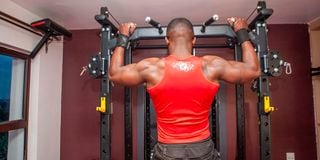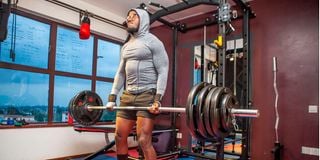How I set up my Sh350,000 home gym
Busy schedules, competing priorities and lack of confidence are some of the main reasons why people don’t go to the gym even when they want to. These are just a few of the obstacles people face when trying to get motivated to exercise at community gyms.
From traveling through traffic—common during peak exercise hours—to the lack of public energy to exercise in crowded places, queuing for exercise machines and locker rooms , achieving your body goals may seem like an unattainable dream to many.
Except it shouldn’t be. If that’s you, home gyms are your saving grace.
If you have space and a small budget to start with, you can put together a gym that works for you. So, what does it take to set up a gym in your home and what are the benefits? BDLife spoke to Eshuchi Lumumba, a long-time fitness enthusiast who works as a teacher, recording artist and interior designer in Nairobi.
“The idea of having a gym in my house came from the problems I faced about two and a half years ago when I moved from Lavington in Nairobi to Ruaka. “Going to the gym meant that I had to go to the gym at least four times a week—the number of workouts I do every week,” he says.

Eshuchi Lumumba does a bench press exercise at his home gym in Ruaka, Kiambu County on September 3, 2024.
Photo credit: Billy Ogada | Nation Media Group
The detour meant he would spend almost two hours in traffic just to get to the gym for an hour’s exercise.
“The amount of time I spent on the road didn’t make sense to me and when I looked around, I couldn’t find a gym that had the right equipment to suit my fitness needs,” she says. exercise.
He quickly did the math and decided that, if he could compound the monthly subscription payments into a lump sum, he would save that money for a long time and save himself the property of home.
“As an interior designer, planning and designing the space was a no-brainer, I installed a floor-to-ceiling mirror – just to transfer the gym to my private space . I put a few of my photos on the other wall to fulfill that feeling. I added downlighters to enhance the aesthetics and provide more lighting for the photography (that’s great),” he says.
His research before starting this job helped him make informed purchases.

Eshuchi Lumumba exercises on rollers at his home gym in Ruaka on September 3, 2024.
“When I went shopping, I knew what I could do without it. For example, I don’t have a treadmill. It is bulky and takes up a lot of space. I can easily get the same results by setting up another station that doesn’t take up much space,” he says.
When building a home gym, performance and efficiency are key decision-making factors. Unlike community gyms, you may not have the space, money and need for additional equipment. What works for you depends on what you are trying to achieve with your body.
Strength training
To improve the performance of his gym, Lumumba first installed a rack cage. He then bought enough plates for his strength training and hired a metal fabricator to build a rack for his dumbbells.
“Most, if not all, types of equipment that need to be installed in a gym will come with an instruction manual. To reduce costs, you can read the instruction manual and install it yourself. This also helps you be familiar with what you have if there is a need to disassemble or fix loose nuts.”
He fixed the floor himself.
“It would have cost me about Sh10,000 to arrange the interlocking floor mats. This would have been an unnecessary expense as this is something that anyone can easily do.”

Eshuchi Lumumba trains at his gym in Ruaka, Kiambu County on September 3, 2024.
Photo credit: Billy Ogada | Nation Media Group
Does it make economic sense in the long run? “Yes, that’s right. Over time, I have spent less money on building a gym than I would have spent on subscriptions two and a half years ago,” he says.
He has spent Sh350,000 so far. He says the money is a fraction of what he would have paid for a good gym membership.
He says: “When you think about it, it’s a salvation for me.
Having a home gym encourages laziness, many would argue. It may be one of the things you worry about most when setting up but you start using it once in a while. Lumumba disagrees.
“I have to remind myself not to go to the gym more than my body needs. For me, I can use it whenever I want. Plus, having it here means I don’t have to get up earlier than I had to in the morning to pass the traffic on the road and the various training stations,” he says.

Eshuchi Lumumba trains at his gym in Ruaka, Kiambu County on September 3, 2024.
Photo credit: Billy Ogada | Nation Media Group
In addition to saving time and money, a gym improves your privacy. Some people don’t have the confidence to exercise in places with strangers or they may have damaged social batteries. Public gyms become a major obstacle in their fitness journey—defying any explanation, but a valid reason for not showing up for reps or any other exercise. Others want privacy for religious reasons.
“Your space ensures privacy from people or forces you don’t want to interact with. It also pulls you back from the pressure of doing things in the gym because it could be a trainer or someone else at the gym. “The body does them. It saves you from the guilt of mass exercise when you can’t get to certain levels like your other gym brethren. It reminds you to do things at your own pace,” he says BDLife.
What about maintenance? “Treat your home gym like you would any room. It needs regular cleaning, and sometimes, special cleaning. Like a community gym, disinfecting areas should be the norm. In addition, having good ventilation in the room ensures that you keep the gym and the whole house fresh,” he says.
Does owning a gym mean you stop going to a community gym? “I go to my gym when I want a change of environment. There is no guilt in going to places you have been before,” he says.
#set #Sh350000 #home #gym